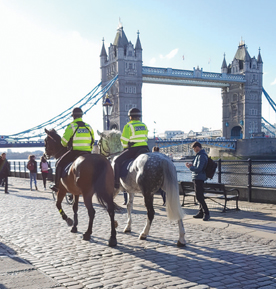Unpredictability is key for countering hostile reconnaissance, the International Security Expo heard at London Olympia yesterday. That message came from Matt Hone, community and business engagement lead for the national Project Servator team at City of London Police. That force began patrolling according to Servator principles in 2013. Professional Security magazine then featured a Servator deployment at the One New Change shopping centre across the road from St Paul’s; and has since gone on to report on Servator at the Glasgow Commonwealth Games in 2014, main railway stations, Sellafield nuclear power station, the intu Lakeside shopping destination in Essex, and most recently Parliament Square when London-wide Servator was launched by the City force, the Met and the Ministry of Defence Police (pictured, part of the launch, City of London Police horses around the Tower of London; Nigel Cook, head of security at the Royal Historic Palaces, which includes the Tower, was among the other speakers at the Expo yesterday).
Matt Hone described unpredictability as ‘fundamentally important’ to Servator. If police and private guard forces are unpredictable in how they deploy – what assets, and timings – that adds to the ‘what ifs’ for hostiles, whether seeking to carry out reconnaissance for acts of terror or indeed other crimes. He spoke of guard forces from different guarding companies in the same area deploying together, in ‘grey areas’, where there are no guard forces and where a security manager is not responsible.
Matt Hone set out some of the thinking by the official CPNI (Centre for the Protection of National Infrastructure) behind Servator. If someone is at a site with hostile intent, and feeling guilty, if a police officer or security guard or even a ‘customer ambassador’ were to go up to them and say hello, to engage them in conversation; that increases the hostile’s worry because they have to lie to justify their presence there; which increases their worry. “That can be devastating to hostile reconnaissance,” Matt said.
He ended with a ‘cultural wish list’ for further developments to Servator, which he stressed was in police terms a ‘Project’ and ongoing rather than an ‘Operation’ with an implied start and end date.
While Servator continues to roll out – Luton Airport was a recent site to report it has Servator-trained police patrols – so public-private co-operation through Servator continues; for one of the strands of Servator is community engagement, whether welcoming and acting on leads from the public, explaining Servator through carefully branded and consistent messages, or deploying non-police besides police ‘assets’, whether monitored CCTV or security officers. Matt Hone suggested that ten years ago, the private security industry would have balked at competitor guarding companies combining on securing beyond their building line; but now there is an appetite to do that, which he described as a ‘massive positive’.
More in the January 2019 print issue of Professional Security magazine. For more on Servator, visit the City of London Police website.









